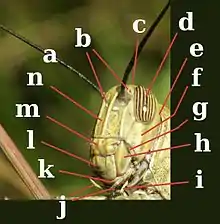frons
English

Pronunciation
- (Received Pronunciation) IPA(key): /fɹɒnz/
- (General American) IPA(key): /fɹɑnz/
- Rhymes: -ɒnz
Noun
frons (plural frontes)
- (anatomy) In vertebrates, especially mammals, the forehead; the part of the cranium between the orbits and the vertex.
- (entomology) The front part of the epicranium or head capsule of many insects; generally speaking, the area below or between the antennae and above the clypeus. Typically it lies between the genal or "cheek" areas on either side of the head.
- 1981, J. F. McAlpine, Manual of Nearctic Diptera, volume 1, →ISBN, page 14:
- In a generalized insect the frons extends from the vertex to the frontoclypeal (epistomal) suture, between the two anterior tentorial pits.
- (entomology) (of Diptera) The postfrons.
- 1985, D. M. Wood, “A taxonomic conspectus of the Blondeliini of North and Central America and the West Indies (Diptera: Tachinidae)”, in Memoirs of the Entomological Society of Canada, volume 117, , page 9:
- In most blondeliines (and in most Tachinidae in general), males have a narrower frons than conspecific females […]
Synonyms
References
- “frons”, in Lexico, Dictionary.com; Oxford University Press, 2019–2022.
- “frons”, in Merriam-Webster Online Dictionary, Springfield, Mass.: Merriam-Webster, 1996–present.
Dutch
Etymology
Borrowed from Middle French fronce, from Old French fronce, from Frankish *hrunkja (“wrinkle”) from Proto-Germanic *hrunkijō, *hrunkitō (“fold, wrinkle”), from Proto-Indo-European *sker- (“to turn, bend”). The semantic narrowing to frowns on the forehead may be influenced by unrelated Latin frōns.
Pronunciation
- IPA(key): /frɔns/
Audio (file) - Hyphenation: frons
- Rhymes: -ɔns
Noun
frons f (plural fronsen, diminutive fronsje n)
- A frown, a furrow of one's eyebrows or forehead.
- Ze keek met een diepe frons naar het document. ― She looked at the document with a deep frown.
- Zijn frons gaf zijn verwarring aan. ― His frown indicated his confusion.
- Ik zag een kleine fronsje op haar voorhoofd. ― I saw a tiny furrow on her forehead.
Related terms
Descendants
- Afrikaans: frons
Latin
Etymology 1

From Proto-Italic *fronts, from Proto-Indo-European *bʰrónts (compare Irish braine (“prow, edge”), Old Norse brandr (“sword blade”)), from *bʰren- (“to project; edge”).
Pronunciation
- (Classical) IPA(key): /frons/, [frõːs̠]
- (modern Italianate Ecclesiastical) IPA(key): /frons/, [frɔns]
Noun
frōns f (genitive frontis); third declension
- (literally):
- (figuratively):
- (transferred sense):
- the outward appearance, external quality, look (as distinct from inward nature)
- the forepart of anything; the front, facade (as opposed to back and sides)
- (military) the front of an army or fleet in battle array
- (surveying, geography) frontage (the part facing the road, river, coastline), usually in ref. to its length
- the coastline; a projecting piece of coast
- the outer extremity or face, the outer or inner surface (eg. of a wall), the top or bottom end (of a trench), the broad side (of a rectangle)
- the exposed surface, outer side of anything
Inflection
Third-declension noun (i-stem).
| Case | Singular | Plural |
|---|---|---|
| Nominative | frōns | frontēs |
| Genitive | frontis | frontium |
| Dative | frontī | frontibus |
| Accusative | frontem | frontēs frontīs |
| Ablative | fronte | frontibus |
| Vocative | frōns | frontēs |
Descendants
- Dalmatian: fruant
- Eastern Romance:
- Italian: fronte f
- Old French: front m
- Old Leonese:
- Asturian: frente f
- Old Occitan: front
- Catalan: front m
- Occitan: frònt m
- Old Galician-Portuguese: fronte
- Old Spanish: fruente f
- Romagnol: frònta
- Sicilian: frunti f
- → English: frons
- → Friulian: front
- → Romansch: frunt, frùnt, front
- → Sardinian: fronte, fronti, frunte
- → Spanish: frontis
- → Venetian: front
Etymology 2

From Proto-Indo-European *bʰron-d- (compare Old English brant (“steep”), Latvian bruôds (“roof ridge”), from *bʰren- (“project”).
Alternative forms
- fruns (dialectal)
Noun
frōns f (genitive frondis); third declension
- (literally) A leafy branch, green bough, foliage.
- Synonym: folium
- Limumque tenent in fronde relictum. (Metamorphoses, 1, 347, Ovidius)
- And they hold some leftover mud in their foliage. (Metamorphoses, 1, 347, Ovid)
- (poetic, transferred sense) A garland made of leafy boughs, a garland of leaves, leafy chaplet.
Inflection
Third-declension noun (i-stem).
| Case | Singular | Plural |
|---|---|---|
| Nominative | frōns | frondēs |
| Genitive | frondis | frondium |
| Dative | frondī | frondibus |
| Accusative | frondem | frondēs frondīs |
| Ablative | fronde | frondibus |
| Vocative | frōns | frondēs |
Related terms
Descendants
References
- “frons” on page 810 of the Oxford Latin Dictionary (2nd ed., 2012)
- “frons”, in Charlton T. Lewis and Charles Short (1879) A Latin Dictionary, Oxford: Clarendon Press
- “frons”, in Charlton T. Lewis (1891) An Elementary Latin Dictionary, New York: Harper & Brothers
- frons in Charles du Fresne du Cange’s Glossarium Mediæ et Infimæ Latinitatis (augmented edition with additions by D. P. Carpenterius, Adelungius and others, edited by Léopold Favre, 1883–1887)
- frons in Gaffiot, Félix (1934) Dictionnaire illustré latin-français, Hachette.
- Carl Meißner, Henry William Auden (1894) Latin Phrase-Book, London: Macmillan and Co.
- to frown: frontem contrahere (opp. explicare)
- to beat one's brow: frontem ferire, percutere
- one can see it in his face: in fronte alicuius inscriptum est
- not to betray one's feelings by one's looks: sententiam fronte celare, tegere
- to frown: frontem contrahere (opp. explicare)